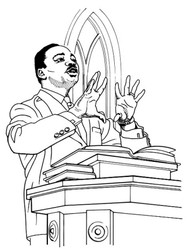The life and legacy of Dr. Martin Luther King, Jr. has inspired many people in these modern times. Dr. King's speeches, letters and sermons stirred the American landscape through the historical Civil Rights Movement of the 1960's. However, Dr. King was influenced, inspired and impacted by others throughout his own life to become an iconic and charismatic historical figure who remains a major influence on today's society.

Influences on Dr. Martin Luther King, Jr
by revbrucej
As many prepare to celebrate the birthday of Nobel Peace Prize winner, Dr. Martin Luther King, Jr. on MLK Day, this article shares some of the influences on Dr. King's life.
Who Influenced Dr. King's Life the Most?
Jesus Influenced Dr. King
Strength to Love
In his stirring book, Strength to Love, Dr. Martin Luther King, Jr. shared his own sermons that included messages based on Christian love. The influence of Jesus Christ and His own messages can be seen throughout this book. As a Baptist minister, Dr. King tapped into the Sermon on the Mount, the Parable of the Good Samaritan and other teachings of Jesus Christ to encourage and inspire others to spread Christian love throughout society as a whole.
Unlike Stride to Freedom and Why We Can't Wait by Dr. King, Strength to Love is the type of book that shows how Dr. King was able to bridge the Messiah's teachings and messages with the social issues of his own day like racism, poverty, injustice and classism. Strength to Love accentuated the philosophy and principles of nonviolence preached continually by Dr. King during the Civil Rights Movement with the practice of turning the other cheek that Jesus shared on the Sermon on the Mount.
Mohandas K. Gandhi (Mahatma Gandhi)
Nonviolent Methods
"Action expresses priorities." - Mahatma Gandhi
Mahatma Gandhi was an influence on Dr. King's implementation of nonviolent resistance. Dr. King embraced Gandhi's nonviolent strategies during the Civil Rights Movement in the United States of America much in the same manner that Gandhi utilized the same types of strategies during his own era in India.
Mahatma Gandhi remains a strong influence on social movements for change. Gandhi implemented a strategy of nonviolent resistance in order to dismantle the rule of Great Britain on India during the 1940's. Refusing to utilize violent means to take on the British authorities, Gandhi implemented peaceful means to demonstrate against the foreign rule of India and the oppressive policies and practices that kept most of India in poverty.
Both Gandhi and King have stood out as historical figures who personified the strategy of nonviolence as a form of social resistance to oppressive conditions. Each man faced reluctance from his peers, but each man left a mark on history by remaining true to the practice despite the obstacles and barriers presented to them both. Sadly, both men died due to assassination.
Henry David Thoreau
Civil Disobedience
Henry David Thoreau's Civil Disobedience had a profound influence on Dr. King's life. As an avid reader of both history and philosophy, Dr. King found Thoreau's public disapproval of the Mexican-American War through "civil disobedience" to serve as a marquee model for the Civil Rights Movement's public protest. In retrospect, Dr. King's views on the Vietnam War seem to offer similar views to Thoreau's views on the Mexican-American War. Each man found that the government's declaration of war against a foreign enemy did not necessarily reflect public sentiment.
While the influence of nonviolent protest on Dr. King's life has been attributed greatly to Mahatma Gandhi, Henry David Thoreau stands out as an influence in civil disobedience that mirrors much of what both Gandhi and King experienced in each of their own public struggles for equality and freedom. Much like Thoreau himself, both King and Gandhi accepted imprisonment rather than compromise their beliefs or principles. Thoreau attacked the government, economic greed and other issues through his classic book Walden. He spewed his existentialist views throughout the pages of the book. His contemporaries included Herman Melville, Nathaniel Hawthorne and other prolific writers and figures within the Existentialist Movement, but Thoreau stands out among these figures due to his Civil Disobedience.
When viewing King's public demonstrations of sit-ins, marches and rallies throughout the Civil Rights Movement, readers should pay close attention to how he addressed the role of government in the lives of the average American citizen. Dr. King's famous speech from the March on Washington professed his dream for the future of America as a society of equality and opportunity for all kinds of people. In essence, his public speeches seem to echo similar sentiments to those expressed by Henry David Thoreau in Civil Disobedience.
I Have a Dream
Free at last. . .
You might also like
Freedom! Which is the Most Democratic Nation in the World?The Democracy Ranking 2012 data is out! Learn which is the most free country...
Willowbrook: A Human Service AtrocityWillowbrook was a New York State Institution that officially opened in Octobe...
Anti-Piracy Police Raid on a Nine Year Old Girl in FinlandThe little girl didn't even manage to download the album, but the police turn...



 Setting up a Sports Schedule for 2013on 12/31/2012
Setting up a Sports Schedule for 2013on 12/31/2012
 Life Without NHL Hockeyon 12/23/2012
Life Without NHL Hockeyon 12/23/2012



Comments